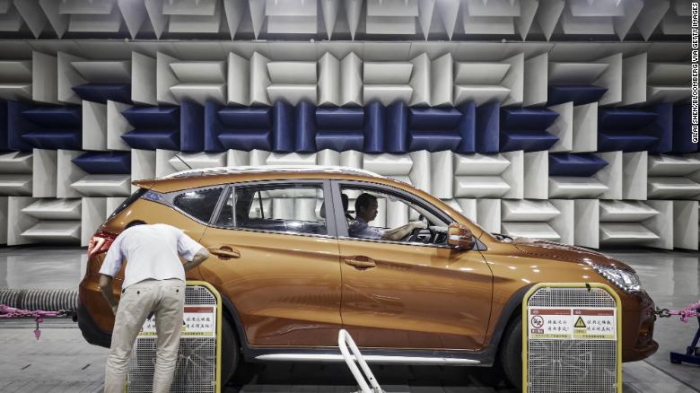China is the driving force in the business of electric vehicle batteries, which European leaders see as vital to the future of the auto industry that employs millions of people across the continent.
It may be too late to catch up.
"Europe might well see its carmakers massively moving production to China in the future," said Simone Tagliapietra, an energy analyst at Fondazione Eni Enrico Mattei, a Milan-based think tank. "This is a huge risk" for the region that's home to companies like Volkswagen (VLKAF), BMW (BMWYY), Mercedes-Benz and Renault (RNSDF), he added.
Building electric cars in China makes sense for companies because that's where most customers are, and it enables them to avoid heavy tariffs on imported vehicles. It also puts their manufacturing plants closer to the supply chain for batteries, which account for about 40% of the value of electric cars.
"It just makes sense to produce electric vehicles where batteries are also produced," Tagliapietra said.
About two-thirds of the world's manufacturing capacity for lithium-ion batteries, those most commonly used in electric vehicles, is in China, according to consulting firm Wood Mackenzie.
Europe is estimated to have just 1% of the market. "There's a few smaller European facilities, but nothing significant," said Gavin Montgomery, Wood Mackenzie's research director of global metals markets in London.
China has the advantage of being the world's biggest market for electric vehicles, accounting for about half of global sales, and international carmakers are investing there in a big way.
Volkswagen announced last year it would pump $12 billion into making electric vehicles in the world's number two economy. US industry leader Tesla (TSLA) is building a factory in Shanghai that it says will eventually churn out 500,000 electric cars a year, compared with about 100,000 annually in the United States.
Even Europe's nascent battery companies are choosing to invest in China rather than at home.
Netherlands-based Lithium Werks, which already has two plants in China, announced plans this month to build a €1.6 billion ($1.8 billion) factory outside Shanghai with a local partner.
The huge facility will eventually pump out lithium-ion batteries to power 160,000 cars a year. Chairman Kees Koolen told CNN that Lithium Werks was investing in China because the infrastructure is better and it's easier to get the permits needed to build a factory. The company said it was put off by the amount of red tape needed to invest in Europe.
"In Europe there's a lot of hassle and a lot of procedures to follow. It takes a long time," Koolen said. The Chinese government has a "long-term vision" for the industry, while Europe does not, he added.
China has put in place targets for electric vehicle production and offered incentives for buyers, which has helped the industry boom.
"Europe has not been able to develop a coherent and solid industrial policy," Tagliapietra said.
The European Union is trying to change that. Its executive branch, the European Commission, launched an action plan this year aimed at encouraging companies to invest more in battery technologies, including offering more funding. It warned European companies were in danger of losing influence over supply chains and environmental standards if they fail to get a foothold in the battery sector.
The global industry's biggest player is a Chinese firm, CATL. Its closest rivals include Japan's Panasonic (PCRFY) and South Korea's Samsung SDI. Panasonic also works with Tesla, which produces its own batteries and is building a giant factory in Nevada to produce them on a huge scale.
More about: China Europe electric-car
















































